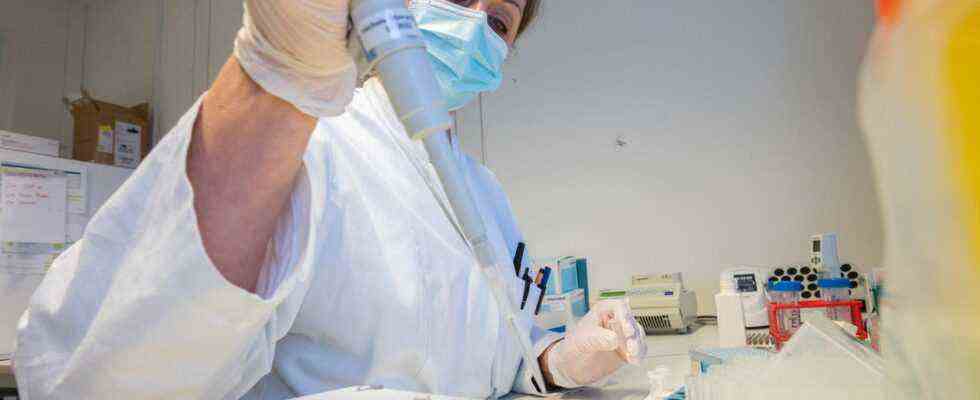Barking cough
Doctors observe an increase in pseudocroup in children due to omicron
Preparing a sequencing of positive PCR tests in a laboratory: The method can be used to detect variants such as omicron
© Julian Stratenschulte / DPA
The coronavirus variant omicron leads to an increased incidence of pseudocroup in small children, as US experts have observed. But that makes the doctors rather positive.
Many parents are familiar with these frightening symptoms: Your child will let out a barking, dry cough, often accompanied by whistling noises when inhaling. As a rule, this is pseudocroup, a respiratory disease that occurs mainly in the cold season, in which the mucous membrane in the area of the larynx and vocal cords becomes inflamed and swollen. It mainly affects small children between the ages of six months and three years. The cause of pseudo-croup is usually an infection with cold viruses.
Physicians in the USA have now observed that the omicron variant of the coronavirus can also trigger pseudocroup. Buddy Creech, an expert in pediatric infectious diseases at Vanderbilt University in Nashville, reported to the US broadcaster NBC News that he and his colleagues had found “pseudocroup-like symptoms” in toddlers who tested positive for Covid-19. The upper part of the children’s airways was severely swollen. “When that happens,” Creech says, “there’s that characteristic barking cough.”
The pediatric pulmonologist Saif al Qatarneh from the University of West Virginia also observes an increase in such diagnoses in connection with a rise in Covid cases in children. He and his colleagues are concerned about what could happen in the coming weeks if omicron continues to spread, al Qatarneh told NBC News. “We’re still two to three weeks away from the peak of the omicron wave. We should expect more children and infants to develop bronchiolitis.”
Omicron tends to affect the upper airways
The probable cause, the physicians say, is that the omicron variant is deposited higher up in the airways than Delta, an observation that the journal “Nature” confirms: omicron does not infect the cells deep in the lungs as easily as the cells in the upper airways, the paper writes, citing a series of laboratory studies. “Young children have relatively small nasal passages, and babies only breathe through their noses. These factors can make upper respiratory disease more serious in children than in adults,” quotes Nature, the pediatric infectious diseases specialist at Children’s Hospital of Philadelphia, AudreyJohn.
The good news: croup and bronchiolitis are diseases that are easy to treat and doctors have decades of experience with them. “Croup is one of the most common pediatric diagnoses,” Mark Kline, chief medical officer at Children’s Hospital in New Orleans, Louisiana, told NBC News. “Infectious pseudocroup is one of the first diseases you learn about as a pediatric resident.”
Amy Edwards, a pediatric infectious disease expert at Rainbow Babies & Children’s Hospital in Cleveland, agrees: Croup can “be scary, but that doesn’t mean there’s a problem with the lungs,” she explained. “For us paediatricians, the fact that we’re seeing more and more children with croup and bronchiolitis is oddly reassuring because we’ve dealt with these diseases our entire professional lives.”
Source: NBC News, “Nature”, Gesundheitsinformation.de


